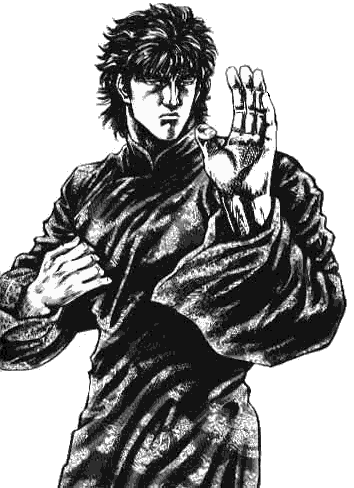Kenshiro Kasumi: Difference between revisions
Daniel Ydal (talk | contribs) No edit summary |
No edit summary |
||
| Line 3: | Line 3: | ||
{{nihongo|'''Kenshirō Kasumi'''|霞 拳志郎|Kasumi Kenshirō''}} {{flagicon|Empire of Japan}} (''character voice'' [[Kōichi Yamadera]]) | {{nihongo|'''Kenshirō Kasumi'''|霞 拳志郎|Kasumi Kenshirō''}} {{flagicon|Empire of Japan}} (''character voice'' [[Kōichi Yamadera]]) | ||
:The main character of ''[[Souten no Ken]]'' and 62nd successor to [[Hokuto Shinken]]. Known in Shanghai as {{nihongo|'''[[wikipedia:Yama_(Buddhism_and_Chinese_mythology)#Yama_in_Chinese.2C_Korean.2C_and_Japanese_mythology|Yán Wáng]]'''|閻王|En'ō}}. Loves smoking cigarettes, reading, and has an excellent sense of smell. | :The main character of ''[[Souten no Ken]]'' and 62nd successor to [[Hokuto Shinken]]. Known in Shanghai as {{nihongo|'''[[wikipedia:Yama_(Buddhism_and_Chinese_mythology)#Yama_in_Chinese.2C_Korean.2C_and_Japanese_mythology|Yán Wáng]]'''|閻王|En'ō}}. Loves smoking cigarettes, reading, playing the piano and has an excellent sense of smell. | ||
:The son of [[Tesshin Kasumi]] and [[Liú Yuè-Yīng]] and the half-brother of [[Ramon Kasumi]], Kenshiro was born with a Big Dipper-shaped birthmark on his head. Because of this, his mother called him '''Ā-Xīng''' (阿星 ''Star''). | :The son of [[Tesshin Kasumi]] and [[Liú Yuè-Yīng]] and the half-brother of [[Ramon Kasumi]], Kenshiro was born with a Big Dipper-shaped birthmark on his head. Because of this, his mother called him '''Ā-Xīng''' (阿星 ''Star''). | ||
:In Japan, he's a lecturer at the Tōwa Women's University. Depicted as somewhat easy going, as well as comical; compared to his [[Kenshiro|namesake and nephew]], Tetsuo Hara describes Kenshiro Kasumi as a combination of the strength of Kenshiro, the good nature of Keiji Maeda from ''[[wikipedia:Keiji (manga)|Hana no Keiji]]'' and the sarcastic attitude of the title character of ''Nakabo Rintaro''. However, remains the stoic persona which would be eventually seen in his nephew. He uses the same catch-phrase as his nephew, {{nihongo|'''"You're already dead"'''|お前はもう死んでいる|Omae wa mō shindeiru}}, but pronounces it in Chinese, '''"Nǐ yǐ jīng sǐ le"''' ({{zh|first=t|t=儞已經死了|s=你已经死了}}). | :In Japan, he's a lecturer at the Tōwa Women's University. Depicted as somewhat easy going, as well as comical; compared to his [[Kenshiro|namesake and nephew]], Tetsuo Hara describes Kenshiro Kasumi as a combination of the strength of Kenshiro, the good nature of Keiji Maeda from ''[[wikipedia:Keiji (manga)|Hana no Keiji]]'' and the sarcastic attitude of the title character of ''Nakabo Rintaro''. However, remains the stoic persona which would be eventually seen in his nephew. He uses the same catch-phrase as his nephew, {{nihongo|'''"You're already dead"'''|お前はもう死んでいる|Omae wa mō shindeiru}}, but pronounces it in Chinese, '''"Nǐ yǐ jīng sǐ le"''' ({{zh|first=t|t=儞已經死了|s=你已经死了}}). | ||
Revision as of 05:24, 19 May 2013

Kenshirō Kasumi (霞 拳志郎 Kasumi Kenshirō) Error creating thumbnail: Unable to create temporary thumbnail file (character voice Kōichi Yamadera)
- The main character of Souten no Ken and 62nd successor to Hokuto Shinken. Known in Shanghai as Yán Wáng (閻王 En'ō). Loves smoking cigarettes, reading, playing the piano and has an excellent sense of smell.
- The son of Tesshin Kasumi and Liú Yuè-Yīng and the half-brother of Ramon Kasumi, Kenshiro was born with a Big Dipper-shaped birthmark on his head. Because of this, his mother called him Ā-Xīng (阿星 Star).
- In Japan, he's a lecturer at the Tōwa Women's University. Depicted as somewhat easy going, as well as comical; compared to his namesake and nephew, Tetsuo Hara describes Kenshiro Kasumi as a combination of the strength of Kenshiro, the good nature of Keiji Maeda from Hana no Keiji and the sarcastic attitude of the title character of Nakabo Rintaro. However, remains the stoic persona which would be eventually seen in his nephew. He uses the same catch-phrase as his nephew, "You're already dead" (お前はもう死んでいる Omae wa mō shindeiru), but pronounces it in Chinese, "Nǐ yǐ jīng sǐ le" (traditional Chinese: 儞已經死了; simplified Chinese: 你已经死了<).





